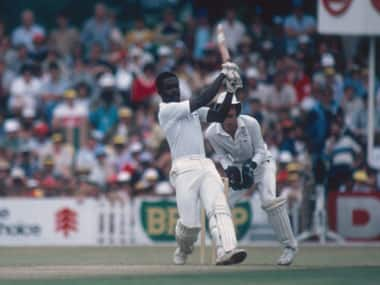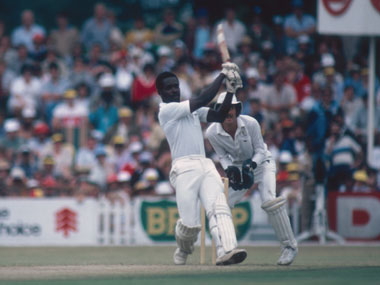On 23 June 1979, Viv Richards had scored 436 runs in just 14 ODIs. He also had a century to his name. Collis King, who would join him at the crease in the World Cup final that day, had played seven matches and scored 68 runs with a highest of 34. So when King took to the crease in the 1979 World Cup final — with Richards at the other end — nobody expected him to overshadow his upcoming teammate. But that’s exactly what happened — despite King scoring 52 runs less than Richards in that match — coming in to bat three places below him. [caption id=“attachment_2093391” align=“alignleft” width=“380”]
 When Collis King took to the crease in the 1979 World Cup final — with Richards at the other end — nobody expected him to overshadow his superstar teammate. Getty Images[/caption] If Richards’ 138 was typical of the burly legend, then King’s surprising 86-off-66 was pre-modern cricket’s greatest example of big hitting. You could call it anything — swashbuckling, destructive, stunning, cracking — but King’s biggest achievement on that day will still remain being remembered ahead of Richards as West Indies won their second World Cup title. All was not healthy when King walked in. Richards was at the other end, but the Windies were on reeling at 99-4 against an England team which had the likes of Geoffrey Boycott, David Gower, Graham Gooch, Ian Botham and Derek Randall. Richards has spoken about the conversation both batsmen had when Kings walked in. “Hey man, take it easy… we have plenty of time,” Richards said — to which King replied: “Smokey, I ain’t gonna let Geoffrey (Boycott) get this, man. In the league there would be no mercy, so why should this be any different?” But as soon as King came in, the run-rate skyrocketed and he and Richards put up a stand worth 139 runs — with the Windies posting a mammoth 286 (60 overs) — virtually unbeatable in those times. King specifically targeted part-time bowlers Boycott, Larkins and Gooch — the three of them went for a total of 86 runs from a combined 12 overs. That’s more than seven runs an over. It was a plan that worked and by the time England had managed to dismiss King, the match was probably out of their grasp. “There was a silly little smirk on his face as he ran in to bowl. It soon vanished as the ball kept disappearing round the ground,” Richards said of Boycott — who deserved to be confident after his economical spell in the semifinal of the tournament. A confidence which King literally shattered. Boycott – who took 17 overs to reach double figures – and Mike Brearley put up an opening stand of 129 runs in 38 overs but fell in quick succession. Randall and Gooch tried to steady the innings, but after they departed, England completely capitulated under the pressure of chasing such a big target. Five of their last six wickets were ducks. Their last seven batsmen managed to score just nine runs as Joel Garner (five wickets in 11 balls) and Colin Croft ran riot. Just like West Indies never managed to bring back the glory days — Collis King failed to make a mark from then on in world cricket. He toured South Africa with the rebel Windies side and his career ended quietly — in complete contrast to the innings that has made him immortal in the Caribbean.
When Collis King took to the crease in the 1979 World Cup final — with Richards at the other end — nobody expected him to overshadow his superstar teammate. Getty Images[/caption] If Richards’ 138 was typical of the burly legend, then King’s surprising 86-off-66 was pre-modern cricket’s greatest example of big hitting. You could call it anything — swashbuckling, destructive, stunning, cracking — but King’s biggest achievement on that day will still remain being remembered ahead of Richards as West Indies won their second World Cup title. All was not healthy when King walked in. Richards was at the other end, but the Windies were on reeling at 99-4 against an England team which had the likes of Geoffrey Boycott, David Gower, Graham Gooch, Ian Botham and Derek Randall. Richards has spoken about the conversation both batsmen had when Kings walked in. “Hey man, take it easy… we have plenty of time,” Richards said — to which King replied: “Smokey, I ain’t gonna let Geoffrey (Boycott) get this, man. In the league there would be no mercy, so why should this be any different?” But as soon as King came in, the run-rate skyrocketed and he and Richards put up a stand worth 139 runs — with the Windies posting a mammoth 286 (60 overs) — virtually unbeatable in those times. King specifically targeted part-time bowlers Boycott, Larkins and Gooch — the three of them went for a total of 86 runs from a combined 12 overs. That’s more than seven runs an over. It was a plan that worked and by the time England had managed to dismiss King, the match was probably out of their grasp. “There was a silly little smirk on his face as he ran in to bowl. It soon vanished as the ball kept disappearing round the ground,” Richards said of Boycott — who deserved to be confident after his economical spell in the semifinal of the tournament. A confidence which King literally shattered. Boycott – who took 17 overs to reach double figures – and Mike Brearley put up an opening stand of 129 runs in 38 overs but fell in quick succession. Randall and Gooch tried to steady the innings, but after they departed, England completely capitulated under the pressure of chasing such a big target. Five of their last six wickets were ducks. Their last seven batsmen managed to score just nine runs as Joel Garner (five wickets in 11 balls) and Colin Croft ran riot. Just like West Indies never managed to bring back the glory days — Collis King failed to make a mark from then on in world cricket. He toured South Africa with the rebel Windies side and his career ended quietly — in complete contrast to the innings that has made him immortal in the Caribbean.
If there is one place Pulasta Dhar wanted to live, it would be next to the microphone. He writes about, plays and breathes football. With stints at BBC, Hallam FM, iSport, Radio Mirchi, The Post and having seen the World Cup in South Africa, the Manchester United fan and coffee addict is a Mass Media graduate and has completed his MA in Broadcast Journalism from the University of Sheffield."
)